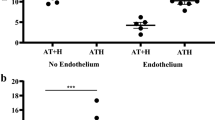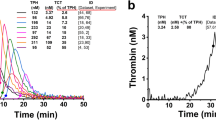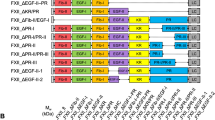Abstract
IT is well known that the prothrombin in plasma is easily susceptible to inactivation, but the nature of the factors responsible for this inactivation has not been clearly understood. M. Gerendas1 has stated that the inactivation of thrombin is due to two parallel and separate causes, namely, adsorption, and a fermentative inactivating process.
This is a preview of subscription content, access via your institution
Access options
Subscribe to this journal
Receive 51 print issues and online access
$199.00 per year
only $3.90 per issue
Buy this article
- Purchase on SpringerLink
- Instant access to full article PDF
Prices may be subject to local taxes which are calculated during checkout
Similar content being viewed by others
References
Gerendas, M., Nature, 157, 837 (1946).
Author information
Authors and Affiliations
Rights and permissions
About this article
Cite this article
CHAK, I., GIRI, K. Effect of Ultra-Filtration and Carbon Dioxide on the Prothrombin Activity of Plasma. Nature 159, 878–879 (1947). https://doi.org/10.1038/159878a0
Issue date:
DOI: https://doi.org/10.1038/159878a0
This article is cited by
-
Regeneration of Prothrombin Activity by Carbon Dioxide
Nature (1948)



